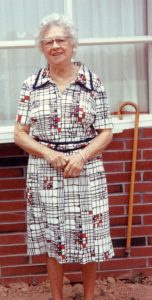
My grandmother Ada lived most of her life in Tyrone, a drab town nestled in the hills of Blair County, Pennsylvania. It was the kind of place where everybody knew you and who your parents were, as in “the Herkimer girl married John Lukens’ boy.” The town had seen better days. The boom years of the railroad had long passed by the 1950’s when I first went back to visit my family. Several lines of the Pennsylvania Railroad converged in Tyrone, carrying coal from the northern mines to the cities, and in the thriving years of the early 1900’s many of the men in town worked for the railroad as engineers, car repairmen, or telegraph-men. My grandfather John had worked for the “Pennsy” as a clerk, a steady, respectable job. But as the cities turned to other fuels, the trains stopped running through the town.
By 1950, Ada lived alone, as a widow, in a little apartment house just off the main street. She stood on the front porch and watched for us when we drove to Tyrone to visit on weekends. During the week she worked as a clerk at the Benjamin Franklin store, the “five and dime”, around the corner. I remember seeing her in the aisles there, in the department for hairnets and shoe polish. She was cheerful and spry, with slender legs and a full bosom encased in mysterious garments with rows of laces. She was always turned out in a colorful print dress, never a housedress, even at home. When she took the train to visit us, she wore a hat and white gloves and carried shopping bags full of luscious chocolates from Gardner’s Candies, Tyrone’s most successful store.
Ada and John had raised their four sons in a white frame house on a run-down street on the outskirts of town. Beside the house stretched the extensive family garden, tended by the four boys. After the family savings were wiped out in the Depression, my father raised pepper and tomato seedlings and sold them wrapped in newspaper to earn spending money. Tomato seedlings cost ten cents a bundle; peppers cost fifteen cents since they were harder to grow. But most of the vegetables from the garden ended up in the family kitchen. Ada canned green beans, tomatoes and other vegetables, and cut up cabbage and salted it to make sauerkraut. She picked Concord grapes from the family vines and pressed them to make tangy grape juice.
By the 1950’s the pulp and paper mill employed many of the men of Tyrone. On the east end of town along the Juniata River, it announced its presence with a pungent sulfurous odor that wafted through the town on warm summer evenings. Ada, like many of the townspeople, was used to this, and hardly noticed it. It was the price to be paid for jobs. She did not live to see the closing of the mill in the 1990’s, which sent Tyrone even further into sleepy decline.
